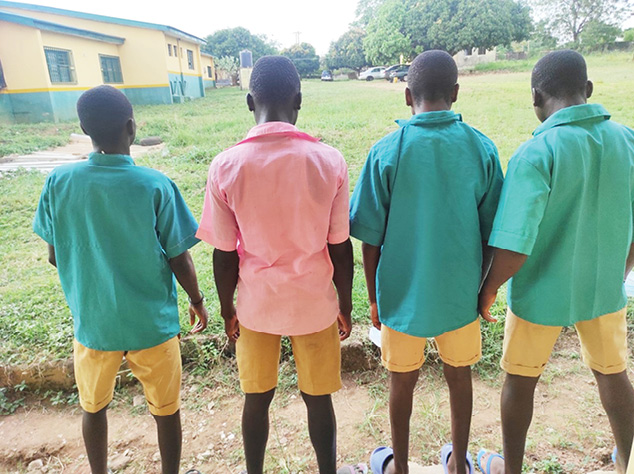When 15-year-old Kabiru (not real name) was taken to the Borstal Training Institute (BTI) in Ilorin, Kwara State, he was reassured that it was a boarding school. But it was not long before he realised that he was in a detention facility. “It was my daddy that brought me here. He told me that it is a school and that I will be living here to be able to become educated and be a good person in the future. Before he left, I noticed that I was in trouble. When they gave me food there for the first time, I saw ‘prison’ imprinted at the back of the plate. Then, I started crying but I was helpless,” he said.
Like Kabiru, another 16-year-old inmate, Sola (not his real name), was tricked to BTI and kept there for over a year. Sola told Daily Trust that his father died three years ago and that his mother married another man. He said it was his mother’s new husband that took him to borstal in connivance with his mother. “They brought me here from Lagos after the death of my father. It was my mother’s new husband that brought me here because I left home for weeks. I was not sleeping at home because of some issues that happened. I have spent about two years here,” he said.
- Ortom calls for self defence in Benue as gunmen kill 4 in hometown
- Fire guts building as PMS tanker explodes in Lagos
Kabiru and Sola were among the 220 inmates crammed at Ilorin BTI which is a facility of the Nigerian Correctional Service. Out of this number, just seven were genuinely kept there with valid warrants while the remaining 213 inmates were unjustifiably incarcerated against their will. These inmates were locked up without any court order. Many of them were taken to Borstal by their parents to evade their parental responsibility on their wards. The parents mentioned stubbornness, truancy, smoking among others as excuses for taking their children to borstal. Some of the inmates are children under age 18 while many of them are under age 21 and others are between ages 22 and 46. They were kept under a very deplorable condition without access to education.

However, respite came for the inmates through the efforts of the Federal Ministry of Justice in collaboration with the United Nations Children’s Fund (UNICEF) with the support of the European Union on the Access to Justice Programme for Children on the Move and other Vulnerable Children in Nigeria. The team escalated the issues and had the ears of the federal government which set up a committee to look into the matter.
The Federal Ministry of Justice in collaboration with the committee and UNICEF commenced the Juvenile Decongestion Programme. The Attorney General of the Federation and Minister of Justice, Abubakar Malami, held a virtual interactive session with the heads of courts, attorneys-general and the commissioners of women affairs of all the 36 states of the federation on the matter. The presidential committee eventually released 122 children from the borstal. The inmates were released by the Presidential Committee on Correctional Reform and Decongestion led by Honourable Justice Ishaq Bello (rtd.) in conjunction with the Federal Ministry of Justice, UNICEF and the United Nations Office on Drug and Crime (UNODC).
Unfortunately, after their release from the facility, some of the parents and family members were not willing to receive them back. The Permanent Secretary, Kwara State Ministry of Women Affairs and Social Development, Hajiya Afusat Nike Ibrahim, said some of the children released from borstal were facing challenges because their families were not willing to receive them.
Daily Trust spoke with some of the parents on the phone with phone numbers supplied by their children and their responses confirmed that they were not willing to take their children back. One of the parents said his child should not have been released because he could not handle the boy. He said: “Why should the government release him? I took him there because I could no longer handle him. They should have allowed my son to remain there.” Other parents spoke the same way, insisting that they were no longer interested in having their children back. They insisted that they were incapacitated to manage their children and their wards should remain in the custody of the government. The parents apparently were apprehensive of tendencies that their children would give them problems when they return home.
Having realised this, UNICEF set up a reintegration programme for their released inmates and trained social workers in the state to ensure smooth reintegration of the children into the society and ensure positive parenting and protective environment for the children. UNICEF trained the social workers and equipped them with tools to conduct home visits on supportive supervision and documentation on the case management process.
The UNICEF Child Protection Specialist, Nkiru Maduechesi, said the training was aimed at enhancing the capacity of social workers to enable them effectively provide case management and to support the community reintegration for the children. Maduechesi said the training is part of the three-year European Union supported access to justice programme for children on the move and other vulnerable children in Nigeria.
Also, a UNICEF Child Protection Specialist, Dr Wilfred Mamah, advised that the Kwara State’s Child Rights Law 2007 should be properly implemented to protect and safeguard the interest of children and secure a better future for them. Mamah highlighted key overriding principles of best interest of the child including right to life, survival and development, nondiscrimination, right to be heard and prohibition of torture, inhuman and degrading treatment. He stated that these principles are critical in caring for children.
Fr Linus Nnkemjinaka Onyenagubor of Don Bosco children’s home in Lagos which is popularly known as “Child Protection Centre” participated in the training of social workers and the reintegration of the inmates into their communities. In a chat with Daily Trust, Onyenagubor said the primary happiness of a child consists in knowing that he/she is loved. He said a child or young person must not only be loved, but must know that he/she is loved. In every young person, even the most difficult, there is a spot for good.
“We are strongly of the view that these children, upon release from detention, are given extra support to enable their reintegration into the wider society, through works with families and community leaders to reduce to the barest minimum any stigma associated with their story. In addition, we suggest that the federal government, the state government, NGOs, private sectors, men and women of goodwill, should join hands to provide educational funding and services such as counselling, longer-term professional assistants such as social street workers, special educators and psychologists for children released from detention. We also beg for employment (when possible) and vocational skills’ placements.
“Based on our experience, we have noticed that children who are returned to the places that are supposed to be their homes without much risk assessments and family mediations often end up going back to the street. This for no other reason is that the situations that pushed them into the streets and unfortunately into conflict with the law are not yet resolved. We urge the federal government and most importantly the state governments and NGOs to ensure that appropriate care and protection are given to all children entering and exiting the juvenile justice system.
The Controller-General of the Nigerian Correctional Service, Haliru Nababa, said the NCS acknowledged the efforts of UNICEF towards ensuring that child justice in Nigeria is given adequate attention, by playing a lead role in ensuring that children in custody are treated within conditions equal to international standards. Nababa said the support from UNICEF would strengthen the institutional mechanism and capacity to provide child friendly services to children in contact with justice in line with national and international legal framework.

 Join Daily Trust WhatsApp Community For Quick Access To News and Happenings Around You.
Join Daily Trust WhatsApp Community For Quick Access To News and Happenings Around You.


